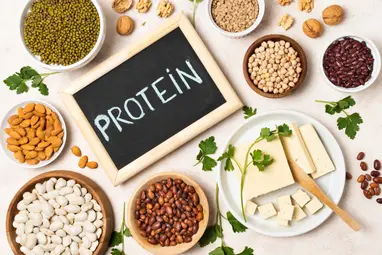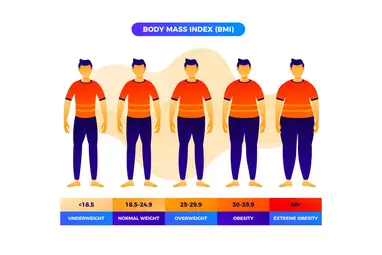A Comprehensive Guide On How To Gain Weight Quickly

A Comprehensive Guide On How To Gain Weight Quickly
Posted on 26th Dec, 2024
Imagine you are at a family function where everyone teases you for being "too skinny", and no matter how much you eat, the scale refuses to budge. While others struggle with weight loss, you may be fighting with your metabolism for weight gain.
Not that, being skinny is always bad, but it can lead to health problems like anemia, a weak immune system, and delayed growth and development.
In fact, in 2022 around 390 million adults under 18 were found underweight, highlighting the importance of addressing this overlooked health concern.
In this guide, we will guide you through practical steps on how to gain weight and help with a sustainable weight gain diet.
Step 1: Determine If You Need to Gain Weight
Our first step will be to find out if you need to gain weight by understanding your BMI.
Calculate your BMI here (you would need your age, height, and current weight):
BMI CALCULATOR
BMI (Body Mass Index) indicates whether a person has a healthy weight for their height. Enter your height and weight to calculate your BMI.
- If your BMI is less than 18.5 = You are Underweight (You must consider gaining weight).
- If your BMI is between 18.5–24.9 = You have a normal weight (Focus on muscle gain if desired).
- If your BMI is equal to or less than 25 = Overweight (Consider losing weight).
Step 2: A Daily Plan for Weight Gain
If you are underweight, this diet plan for weight gain focused on calorie surplus and exercise, will help you gain weight thoroughly.
Phase 1: Early Morning (Hours 1–3)
1. Hydrate: Begin your day with 500ml of warm water to boost digestion.
2. Yoga and Light Stretches (Optional for Non-Gym-Goers):
- Practice Surya Namaskar for 10–15 minutes to improve flexibility, digestion, and energy levels.

- Add simple poses like Bhujangasana and Pawanmuktasana for better metabolism.

3. High-Calorie Breakfast: Choose nutrient-dense options that combine protein, healthy fats, and carbohydrates.
- Examples: Upma with peanuts, paratha with ghee and curd, or poha with peanuts and boiled eggs.
- Add a smoothie of bananas, dates, and milk for a calorie boost.
4. Strength Training (optional): If possible, perform a 20-minute strength-focused workout in the morning to promote muscle growth.
- Squats, push-ups, planks, and dumbbell presses.
- For beginners, try bodyweight exercises like step-ups or lunges
Phase 2: Mid-Morning (Hours 3–5)
1. Snacking: Choose a calorie-dense snack to keep your energy levels high.
- Options: A small bowl of roasted peanuts, a banana with peanut butter, a sweet potato chaat with lemon and black salt, or a handful of mixed dry fruit.
2. Hydration: Add coconut water or lassi for added nutrients.
Phase 3: Lunch (Hours 5–8)
1. Healthy Lunch: Choose a balanced lunch with protein, carbohydrates, and healthy fats.
- Example: Dal, rice, and sautéed vegetables with grilled paneer, roti, and salad.
- Add calorie boosters like ghee or butter
2. Take A Short Walk: After lunch, consider a short 5-10 minute walk to aid digestion.
Phase 4: Refuel and Energize (Hours 8–11)
1. Time For Snack or mini-meal: Snack on makhana (fox nuts), dry fruits laddoo, or a bowl of curd with jaggery.
2. Keep Yourself Hydrated: Drink calorie-containing beverages like fresh fruit juices or coconut water.
Phase 5: Evening workout (Hours 11–14) (if not done in the morning)
1. Strength Training Routine (Gym-Based):
- Exercises: Deadlifts, bench presses, barbell rows, shoulder presses, and pull-ups.
- Focus on lifting heavier weights with fewer repetitions to promote muscle growth.
- Focus on compound exercises such as squats, deadlifts, and bench presses to build muscle.
2. Post-workout Meal: A protein shake blended with banana and dates, GNC weight gainer, or scrambled eggs with toast.
Phase 6: Dinner (Hours 14–17)
1. Nutrient-dense dinner: Combine protein-rich foods with complex carbs and healthy fats:
- Example: Grilled fish, quinoa pulao, vegetable stir-fry with olive oil, or paneer tikka.
Phase 7: Bedtime (Hours 17–24)
1. Bedtime Snack:
- Options: A glass of warm milk with turmeric to nourish your body while you sleep.
2. Relaxation and Sleep Prep: Do deep breathing exercises or a 5-minute meditation session to reduce stress and prepare for sleep.
- Ensure you get 7–9 hours of quality sleep to recover and build muscle.
Step 3: Tips for Sustainable Weight Gain
- Focus on Nutrient-Dense Foods
Incorporate calorie-dense options like nuts and seeds, avocados, cheese, and healthy oils into your meals. Avoid relying on junk food, which can lead to unhealthy fat gain.
- Increase Your Protein Intake
Aim for 1.5–2.2 grams of protein per kilogram of body weight daily through food sources like eggs, chicken, fish, legumes, tofu, and protein powders.
- Stay Consistent with Meals
Eat at least 3 main meals and 2–3 snacks daily to maintain a calorie surplus.
- Consider Weight Gain Supplements
Those who are underweight often have a fast metabolism and consume fewer calories a day, choosing weight gainer supplements will provide the calories and nutrients that a food diet may not fulfill.
- Track Progress and Adjust
Monitor your weight every week, your calorie intake should gradually increase by 300–500 calories daily.
- Focus on Quality Sleep and Stress Management
Aim for 7–9 hours of quality sleep each night to support muscle recovery and overall health.
Closing Thoughts
If you are wondering, how to gain weight? The simple answer is increasing your calorie intake by at least 300 calories per day with nutrient-dense and healthy food options.
However, a weight gain diet alone is not the right approach, pairing it with strength training and yoga is important to keep it balanced. This will avoid letting the excess calories in your body turn into fat.
For a healthy diet plan for weight gain contact our health experts here.

Health articles from our experts

A Comprehensive Guide On How To Gain Weight Quickly

Muscle-Building Routine and Supplements for Maximum Gains

A Guide with Simple Tips To Follow For Weight Loss

Top 10 Foods That Are High in Protein

5 Best Whey Protein Powders in India

Understanding BMI: The Key to Weight-Health Connection

List of Top Whey Proteins for Muscle Gain

Top Vitamins for a Healthy Immune System

Finding Out the Best Daily Wellness Supplements

